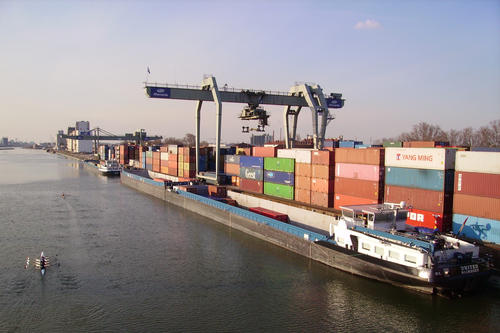Governing by Numbers
Political scientist Philipp Lepenies studies the role played by statistical indicators in modern-day politics.
Apr 21, 2017
“In many cases, citizens’ happiness is no longer solely connected to growth or per capita income,” says political scientist Philipp Lepenies, who criticizes excessive focus on GDP.
Image Credit: Immanuel Giel via Wikimedia Commons, CC0
Philipp Lepenies is a visiting professor of comparative political science at Freie Universität Berlin.
Image Credit: Privat
When politicians want to initiate important political, social, and economic processes of change, they are increasingly turning to statistically measurable values. Philipp Lepenies, a professor of political science at the Otto Suhr Institute, says the Sustainable Development Goals (SDGs) adopted by the United Nations in the fall of 2015, which call for a reduction of extreme poverty by 2030, may offer the most prominent example of this. According to Lepenies, these goals are intended to bring about no less sweeping a change than a worldwide shift toward sustainable development.
“Nowadays, a unique, important instrumental role is ascribed to indicators,” says Lepenies, who is currently heading the Environmental Policy Research Centre at Freie Universität. “Joseph Stiglitz, a prominent American economist, put it this way: What we measure determines our behavior. And if we measure wrong, we take the wrong actions.” For several years now, efforts have been under way in multiple OECD countries to establish “alternative” measures of welfare in a bid to prompt governments to focus less on economic growth and more on boosting quality of life and citizen satisfaction.
Great Significance of GDP
Here, too, statistical indicators play a crucial role. The reason for the search for alternative indicators is the fact that one particular indicator has come to dominate the discourse worldwide: gross domestic product (GDP) and the rate of change therein, also known as economic growth. GDP was first invented during World War II, Lepenies explains, and during just that short time, it has come to be used as an indicator of various things – social welfare, geopolitical power, and the status of economic development – even though it actually only measures the value of production of goods and services.
GDP Alone Is Not Enough
But Lepenies believes the past few years have clearly shown that GDP is in fact not suited to drawing conclusions about how well people in a given country are doing. “In many cases, citizens’ happiness is no longer solely connected to growth or per capita income,” he says. Besides that, he continues, GDP does not factor in the environmental consequences of growth, so certain patterns of consumption and production are considered to be successful even though they are anything but sustainable, instead contributing to climate change.
These issues with GDP have been known for a long time, Lepenies says. But it is more recent trends, particularly the influence of research on happiness and behavioral economics on politics, that have prompted governments to consider alternative measurements and pay greater attention to parameters such as a “good life.” Another aspect that comes into play right now, with the awareness of the powerful position and dominance of GDP, is the belief that the actions of governments could be swayed through alternative statistical indicators. As Lepenies puts it, “There is a belief in governing by the numbers.”
Strengthening Democratic Processes
In many countries, citizens are now being asked to articulate for themselves what is important to them in life, and how it should be measured, Lepenies explains. The OECD, which is the driving force behind many of these national initiatives, is undertaking these actions in the belief that it is necessary to redefine the Western notion of progress. The organization has indicated that the current system, which is geared toward industrialization and economic growth, no longer has a future in light of major challenges such as climate change and the worsening social cohesion seen in many countries around the world. The OECD also says that not only do indicators define transparent goals, but quantifiable targets also give citizens a way to better gauge their governments’ performance. This can help to strengthen democratic processes.
Debate Surrounding GDP: Unique Moment in History
Philipp Lepenies, a professor of comparative political science, is taking a closer look at the various national initiatives involved. His research focuses not only on the indicators that are proposed in the specific context themselves or on the methodological strengths and weaknesses they entail, but also on the processes of selecting indicators and the analysis of important institutions, stakeholders, and national debates about what is important to people.
These initiatives are only just getting off the ground, Lepenies points out. He says it will be exciting to find out what kinds of effects these activities have in the different countries. Will the alternative indicators be able to break the power of GDP and change the behavior of governments? “The fact that governments all over the world are considering alternatives to GDP is something that has never before been seen on this scale,” Lepenies says. “But you do also have to see that the dogma of growth is still very, very persistent in politics.”
Studying the national initiatives aimed at alternative methods of measuring welfare therefore also includes analyzing political conflicts and controversies that can affect these initiatives – for example, the sharp debates found in countries such as Germany regarding the “right” way to measure poverty and inequality. In any event, Lepenies says, alternative welfare indicators are rooted in normative decisions of elemental importance regarding what constitutes a good life and quality of life.
Measuring a “Good Life”?
What Lepenies would like to see in political science is a systematic analysis of the role that statistical indicators play in politics. This includes a solid technical understanding of measurement methods and indicators. But indicators are social and political constructs that are integrated into specific contexts. They define how socioeconomic and political phenomena are perceived and assessed, he explains. And, as Stiglitz says, they also affect human behavior. The more the social sciences focus on quantitative methods, Lepenies says, the more important it is to also engage in research and teaching regarding how indicators are used in politics and how much they are themselves the product of political processes. Ultimately, he says, indicators should be used to achieve no less an aim than a shift toward sustainable development and a “good life.”
Further Information
Philip Lepenie's study on the political history of the gross domestic product (The Power of a Single Number) was published in English by Columbia University Press in 2016. A Chinese translation of the book is in progress.
- Prof. Dr. Philipp Lepenies
Head of the Environmental Policy Research Center FFU (interim) and Visiting Professor for Comparative Politics
Tel.: +49 30 838 566 87, Email: compol-ffu-sekr@polsoz.fu-berlin.de


